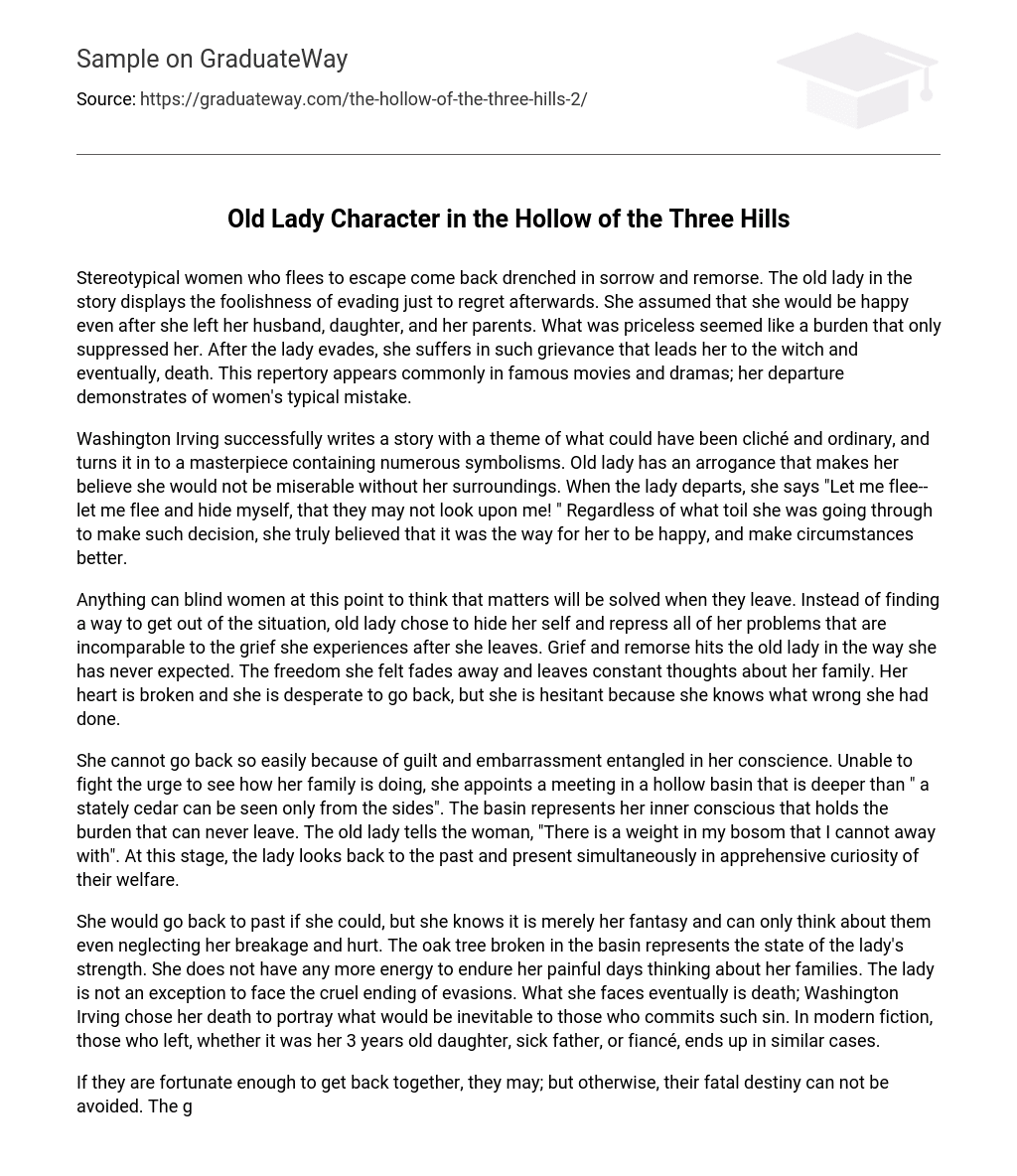The story features a stereotypical woman who runs away in an attempt to find happiness but ultimately returns filled with sadness and regret. This is demonstrated by an old lady in the narrative who exemplifies the folly of avoiding one’s problems only to later regret it. She believed that leaving her husband, daughter, and parents would bring her happiness, but instead she found herself burdened and suppressed. After leaving, she experiences such immense sorrow that she seeks the help of a witch and ultimately meets her demise. This storyline is a common theme in popular movies and dramas, serving as a typical example of women making this mistake.
Washington Irving skillfully transforms a potentially cliché and mundane story into a masterpiece abundant in symbolism. The elderly woman possesses a sense of arrogance, leading her to believe that she can avoid misery by distancing herself from her environment. Upon departing, she exclaims, “Let me flee- let me flee and hide myself, that they may not look upon me!” Despite the hardships she endures to reach this conclusion, she genuinely believes that this is the path to happiness and improvement of her circumstances.
Blinding women to think that leaving will solve their problems, anything at this point can. Rather than seeking an escape, the old lady chooses to conceal and suppress all her issues. However, the sorrow she experiences after departing cannot be compared. Unexpectedly, grief and regret strike the old lady. The initial sense of freedom diminishes and is replaced by constant thoughts about her family. She is heartbroken and desperate to return but hesitates due to being aware of her past misdeeds.
The woman is weighed down by feelings of guilt and embarrassment, making it difficult for her to return easily. However, she still feels an urge to ensure her family’s well-being. To do so, she organizes a meeting in a deep hollow basin that remains hidden from every angle, even from a towering cedar tree. This basin represents her inner consciousness that carries an eternal burden. The elderly woman expresses her struggle with the phrase “There is a weight in my bosom that I cannot eliminate”. At this moment, she finds herself simultaneously reflecting on both the past and present, filled with apprehension and curiosity about their welfare.
Despite the lady’s desire to return to her past, she acknowledges that it is merely a fantasy. Her constant preoccupation with memories of her previous life disregards her own suffering and anguish. The dilapidated oak tree in the basin serves as a symbol of her weakened state, signifying her inability to bear the pain while fixating on thoughts of her family. Similar to others who attempt to evade reality, she ultimately faces a harsh destiny. Washington Irving employs her demise as an illustration of the inevitable repercussions of such behaviors. In contemporary literature, characters who depart – whether it be a young daughter, an ill father, or a fiancé – often find themselves in comparable predicaments.
If they are fortunate enough to reconcile, they may opt to do so; if not, their inescapable fate cannot be avoided. The lady’s mental state is symbolized by the green pool, mirroring her illness and agony. The specific hue of green signifies her arrogance and lack of wisdom, which ultimately lead to her downfall. However, individuals frequently fail to anticipate the consequences of such transgressions. While some may acknowledge that retribution will eventually catch up with them, others remain unaware. Nevertheless, the punishment they encounter is equally as severe as the harm they cause upon others. Ultimately, the lady’s tragic demise is a consequence of her own actions.





